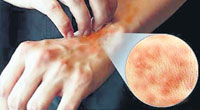
| When the skin gets red with bumpy weals Urticaria is an allergic skin rash also known as 'nettle rash' or hives. There are two distinct types: acute urticaria is often caused by an allergy and can last between several hours and six weeks; chronic urticaria persists beyond six weeks.
What are the causes? The most likely to cause acute urticaria are allergy to pets, horses, latex or food such as shellfish, nuts, fruit and dairy. Bee or wasp stings may cause urticaria, along with allergies to medicines such as antibiotics, ACE inhibitors and aspirin. Certain viral infections such as glandular fever and hepatitis B, and blood transfusions and vaccines can also cause hives. Certain parasitic infections, blood pressure drugs or stress may trigger it. The cause of chronic urticaria is much more difficult to identify. It often ends up being diagnosed as chronic idiopathic urticaria - which means the cause is unknown! Certain parasitic infections, blood pressure drugs or stress may trigger it. Chronic urticaria can also be triggered by physical factors such as exposure to heat, cold, sunlight, vibration or pressure on the skin. Some people have such sensitive skin that any rubbing will cause raised red lines to develop what is called dermatographism. Underlying thyroid disease, cancer or autoimmune disease such as lupus can provoke urticaria. Occasionally an inherited deficiency of the C1 esterase inhibitor enzyme leads to a non-itchy form of urticaria and swelling called 'hereditary angioedema'. What are the symptoms? The rash consists of a number of raised bumpy weals surrounded by red skin. It tends to move about or migrate around on the body. In chronic cases, the itchiness may cause sleepless nights and lead to depression. The condition tends to settle and then suddenly relapse again with co-existent viral illnesses, stress and aspirin containing medication. This chronic pattern may recur for up to three years. If your urticaria does not disappear after a few weeks, or does not respond to antihistamine medication, and is accompanied by any other health problem, you should go to your doctor. Blood tests may identify an allergy or underlying immune disease. What treatment can you get? High doses of antihistamines may be necessary for prolonged periods of up to six weeks. And short courses of oral steroids may be necessary to settle severe symptoms. Specialist investigations may be necessary to exclude another underlying illness. |
|| Front
Page | News | Editorial | Columns | Sports | Plus | Financial
Times | International | Mirror | TV
Times | Funday
Times | MediScene || |
| |
Copyright
2006 Wijeya
Newspapers Ltd.Colombo. Sri Lanka. |
